人教版(2019)选择性必修 第二册Unit 2 Bridging Cultures Using Language Listening and Speaking课件(共18张,内嵌音频和视频)
文档属性
| 名称 | 人教版(2019)选择性必修 第二册Unit 2 Bridging Cultures Using Language Listening and Speaking课件(共18张,内嵌音频和视频) | 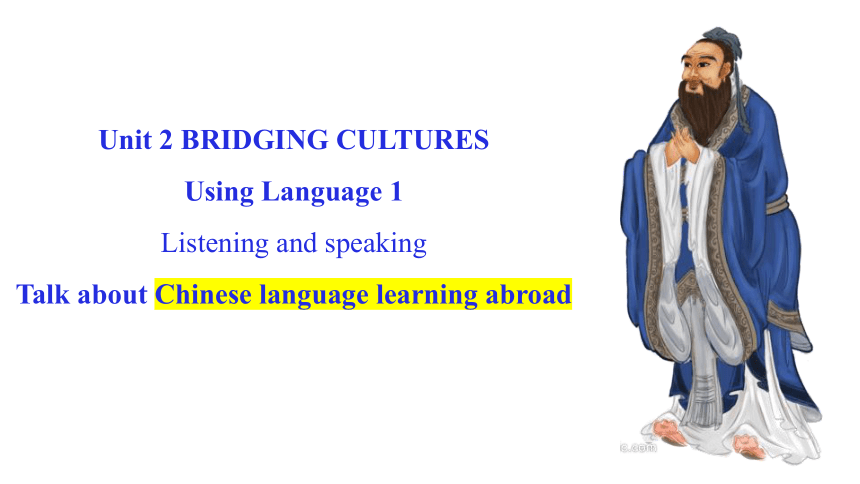 | |
| 格式 | pptx | ||
| 文件大小 | 58.7MB | ||
| 资源类型 | 教案 | ||
| 版本资源 | 人教版(2019) | ||
| 科目 | 英语 | ||
| 更新时间 | 2025-02-21 15:39:53 | ||
图片预览

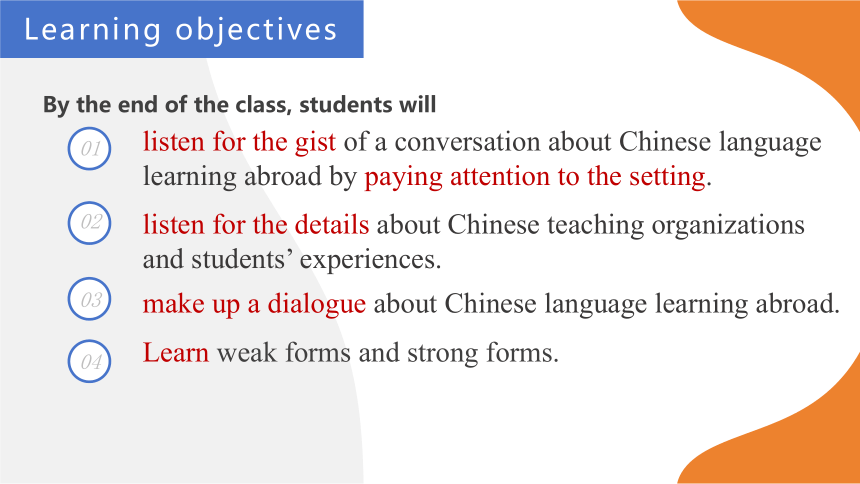

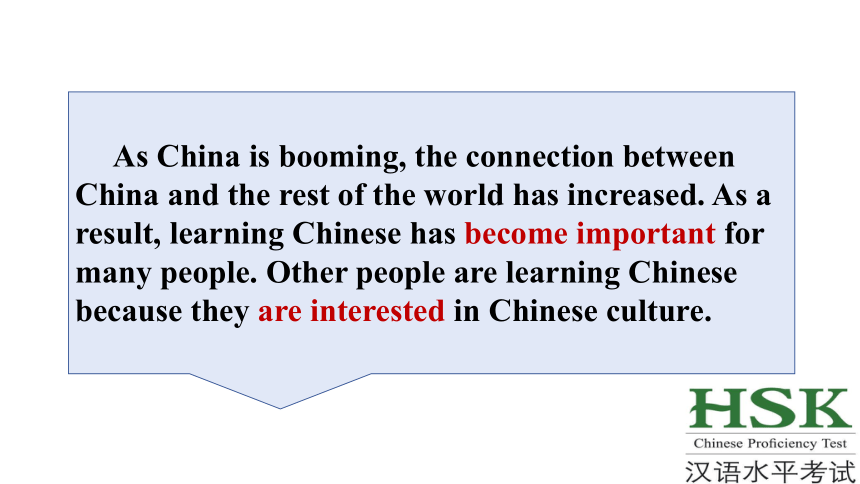

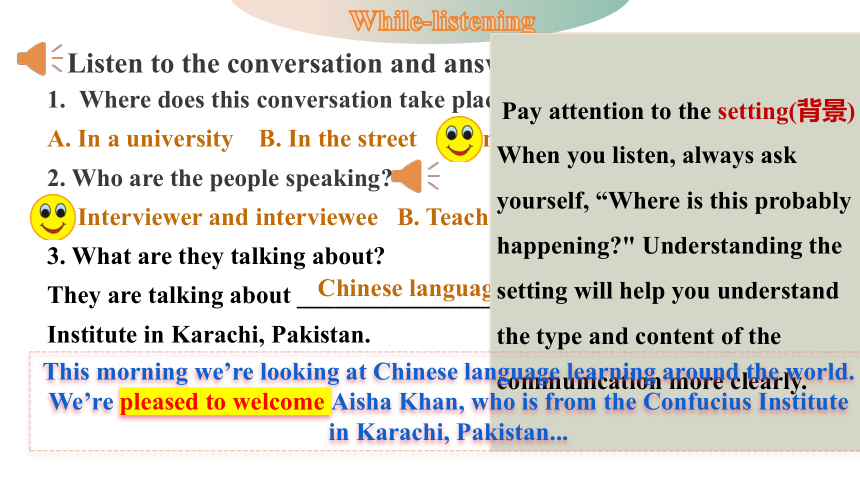
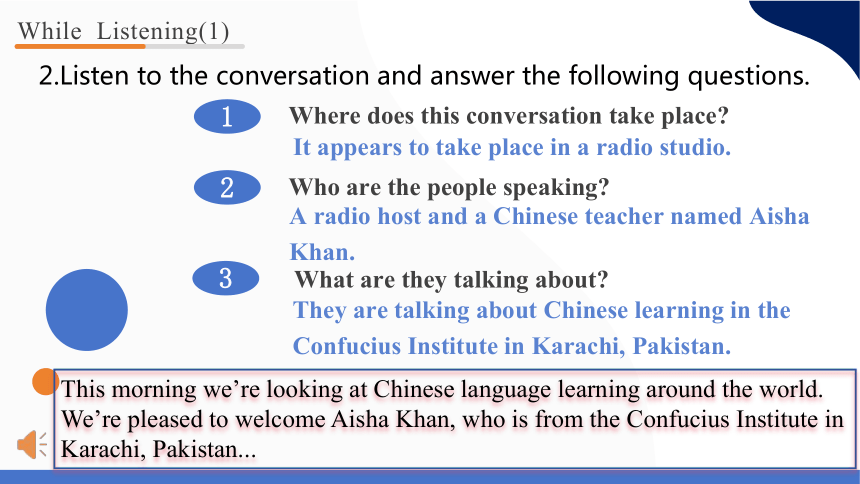
文档简介
(共18张PPT)
Unit 2 BRIDGING CULTURES
Using Language 1
Listening and speaking
Talk about Chinese language learning abroad
listen for the gist of a conversation about Chinese language learning abroad by paying attention to the setting.
listen for the details about Chinese teaching organizations and students’ experiences.
By the end of the class, students will
01
02
03
Learning objectives
make up a dialogue about Chinese language learning abroad.
Learn weak forms and strong forms.
04
Lead in
1. What do you know about Chinese language learning abroad
As China is booming, the connection between China and the rest of the world has increased. As a result, learning Chinese has become important for many people. Other people are learning Chinese because they are interested in Chinese culture.
2. How do people from other countries learn about Chinese culture
Lead in
By watching films, visiting China, attending a Confucius Institute, etc.
[ et set r ; t set r ]
Listen to the conversation and answer the following questions.
While-listening
Where does this conversation take place
A. In a university B. In the street C. In a radio studio
2. Who are the people speaking
A. Interviewer and interviewee B. Teacher and student C. Friends
3. What are they talking about
They are talking about __________________________ in the Confucius Institute in Karachi, Pakistan.
Chinese language learning
Pay attention to the setting(背景)
When you listen, always ask yourself, “Where is this probably happening " Understanding the setting will help you understand the type and content of the communication more clearly.
This morning we’re looking at Chinese language learning around the world. We’re pleased to welcome Aisha Khan, who is from the Confucius Institute in Karachi, Pakistan...
1
2
Where does this conversation take place
Who are the people speaking
2.Listen to the conversation and answer the following questions.
While Listening(1)
3
What are they talking about
It appears to take place in a radio studio.
A radio host and a Chinese teacher named Aisha Khan.
They are talking about Chinese learning in the Confucius Institute in Karachi, Pakistan.
This morning we’re looking at Chinese language learning around the world. We’re pleased to welcome Aisha Khan, who is from the Confucius Institute in Karachi, Pakistan...
At first, we only had a few students and teachers… The institute is also a centre for Chinese activities, like a bridge into China.
Welcome to the Confucius Institute.
Learn to _____________ and all about ________________!
Our institute has grown! We started with _________________________ but now we have many more. It is a centre for __________________. You can learn and practise fascinating Chinese traditions.
While-listening 2
Apart from language, she taught us about Chinese culture
speak Chinese
Chinese culture
a few students and teachers
Chinese activities
You can learn and practise fascinating Chinese traditions. Knowledge of the Chinese language and culture is important because of increasing __________________________________.
Many students go on to great jobs in __________________.
Join us today to help break down language and _________________, and bring the world together!
While-listening 2
I believe its importance has grown ,because trade between China and Pakistan has increased….
trade between China and Pakistan
cultural barriers
Chinese companies
1
2
What made Aisha feel like she was part of Ms Hu's family
Why did Aisha want to become a teacher
4. Listen again and answer the questions.
3
Why do students learning Chinese see it as beneficial to their future
Making and eating delicious dumplings together in Ms Hu’s family.
Because she wanted to carry on Ms Hu’s work.
Because learning Chinese would help them find good jobs at Chinese companies.
While Listening(3)
5. Imagine you're interviewing a student at a Confucius Institute in another country about his or her experience. Work with a partner to brainstorm what the interviewer might ask and how the student might answer.
Role Play
Imagine you're interviewing a student at a Confucius Institute in another country about his or her experience.
1. Brainstorm the questions for the interviewer and possible answers.
2. Then role-play the interview.
3. Use the phrases and questions in the box to help you.
Interviewing someone and
A: Hi, Jane. Welcome to the show!
B: Thanks for inviting me.
A: Tell us, what was your biggest challenge in learning Chinese at the
beginning
B: Well, suppose it was difficult to grasp the tones at first.
A: I bet! Did joining the Confucius Institute help overcome this
problem
B: Absolutely! Getting involved with Chinese cultural activities there definitely helped a lot...
1
2
What problem is Lu Yao having
What may be the cause of the problem
1.Read the conversation and answer the questions:
Pronunciation
3
How can he solve his problem
He is having a problem with an English listening task.
He has trouble hearing the weak forms of the words
which are not stressed.
He should pay more attention to the weak forms, watch some movies, and study how the weak forms are used.
Watch the video about the weak forms. Learn to practise the rules.
2. Listen to the conversation above and underline the weak forms the speakers used. Then practice the conversation with your partner.
Lu Yao: Excuse me, Miss Conner. I'm having a problem with
this English listening task. Some words are
pronounced really fast and sound different.
Miss Conner: Oh, let me listen .. Yes, that's probably because
the words are not being stressed. You see, English is
a stress-based language.
Lu Yao: So does this mean I need to know which words are
stressed and which are not
Miss Conner: Yes, I'm afraid so. English words have a strong
form and a weak form.Words like pronouns, articles,
prepositions, and so on are often not stressed. So we
usually use the weak form for them when we speak.
Lu Yao: Excuse me, Miss Conner. I'm having a problem with
this English listening task. Some words are
pronounced really fast and sound different.
Miss Conner: Oh, let me listen .. Yes, that's probably because
the words are not being stressed. You see, English is
a stress-based language.
Lu Yao: So does this mean I need to know which words are
stressed and which are not
Miss Conner: Yes, I'm afraid so. English words have a strong
form and a weak form.Words like pronouns, articles,
prepositions, and so on are often not stressed. So we
usually use the weak form for them when we speak.
Lu Yao: Oh no. When I speak, I worry people won't
understand me, so I always try to pronounce all my
words really clearly. No wonder my classmates say I
sound like a robot!
Miss Conner: Oh dear! Well, I suggest you pay more
attention to the weak forms. For example, in the
sentence "Are you studying hard ", the words“are"
and "you" are pronounced as /a/ and /ja/.
Lu Yao: Oh, I get it. Thanks, Miss Conner.
Miss Conner: You're welcome. I also suggest you watch some
movies and study how the weak forms are used.
Lu Yao: That's great advice, Miss Conner! I'm going to
watch a movie right now. Thanks again! Bye!
Lu Yao: Oh no. When I speak, I worry people won't
understand me, so I always try to pronounce all my
words really clearly. No wonder my classmates say I
sound like a robot!
Miss Conner: Oh dear! Well, I suggest you pay more
attention to the weak forms. For example, in the
sentence "Are you studying hard ", the words“are"
and "you" are pronounced as /a/ and /ja/.
Lu Yao: Oh, I get it. Thanks, Miss Conner.
Miss Conner: You're welcome. I also suggest you watch some
movies and study how the weak forms are used.
Lu Yao: That's great advice, Miss Conner! I'm going to
watch a movie right now. Thanks again! Bye!
Thank you for your listening.
Unit 2 BRIDGING CULTURES
Using Language 1
Listening and speaking
Talk about Chinese language learning abroad
listen for the gist of a conversation about Chinese language learning abroad by paying attention to the setting.
listen for the details about Chinese teaching organizations and students’ experiences.
By the end of the class, students will
01
02
03
Learning objectives
make up a dialogue about Chinese language learning abroad.
Learn weak forms and strong forms.
04
Lead in
1. What do you know about Chinese language learning abroad
As China is booming, the connection between China and the rest of the world has increased. As a result, learning Chinese has become important for many people. Other people are learning Chinese because they are interested in Chinese culture.
2. How do people from other countries learn about Chinese culture
Lead in
By watching films, visiting China, attending a Confucius Institute, etc.
[ et set r ; t set r ]
Listen to the conversation and answer the following questions.
While-listening
Where does this conversation take place
A. In a university B. In the street C. In a radio studio
2. Who are the people speaking
A. Interviewer and interviewee B. Teacher and student C. Friends
3. What are they talking about
They are talking about __________________________ in the Confucius Institute in Karachi, Pakistan.
Chinese language learning
Pay attention to the setting(背景)
When you listen, always ask yourself, “Where is this probably happening " Understanding the setting will help you understand the type and content of the communication more clearly.
This morning we’re looking at Chinese language learning around the world. We’re pleased to welcome Aisha Khan, who is from the Confucius Institute in Karachi, Pakistan...
1
2
Where does this conversation take place
Who are the people speaking
2.Listen to the conversation and answer the following questions.
While Listening(1)
3
What are they talking about
It appears to take place in a radio studio.
A radio host and a Chinese teacher named Aisha Khan.
They are talking about Chinese learning in the Confucius Institute in Karachi, Pakistan.
This morning we’re looking at Chinese language learning around the world. We’re pleased to welcome Aisha Khan, who is from the Confucius Institute in Karachi, Pakistan...
At first, we only had a few students and teachers… The institute is also a centre for Chinese activities, like a bridge into China.
Welcome to the Confucius Institute.
Learn to _____________ and all about ________________!
Our institute has grown! We started with _________________________ but now we have many more. It is a centre for __________________. You can learn and practise fascinating Chinese traditions.
While-listening 2
Apart from language, she taught us about Chinese culture
speak Chinese
Chinese culture
a few students and teachers
Chinese activities
You can learn and practise fascinating Chinese traditions. Knowledge of the Chinese language and culture is important because of increasing __________________________________.
Many students go on to great jobs in __________________.
Join us today to help break down language and _________________, and bring the world together!
While-listening 2
I believe its importance has grown ,because trade between China and Pakistan has increased….
trade between China and Pakistan
cultural barriers
Chinese companies
1
2
What made Aisha feel like she was part of Ms Hu's family
Why did Aisha want to become a teacher
4. Listen again and answer the questions.
3
Why do students learning Chinese see it as beneficial to their future
Making and eating delicious dumplings together in Ms Hu’s family.
Because she wanted to carry on Ms Hu’s work.
Because learning Chinese would help them find good jobs at Chinese companies.
While Listening(3)
5. Imagine you're interviewing a student at a Confucius Institute in another country about his or her experience. Work with a partner to brainstorm what the interviewer might ask and how the student might answer.
Role Play
Imagine you're interviewing a student at a Confucius Institute in another country about his or her experience.
1. Brainstorm the questions for the interviewer and possible answers.
2. Then role-play the interview.
3. Use the phrases and questions in the box to help you.
Interviewing someone and
A: Hi, Jane. Welcome to the show!
B: Thanks for inviting me.
A: Tell us, what was your biggest challenge in learning Chinese at the
beginning
B: Well, suppose it was difficult to grasp the tones at first.
A: I bet! Did joining the Confucius Institute help overcome this
problem
B: Absolutely! Getting involved with Chinese cultural activities there definitely helped a lot...
1
2
What problem is Lu Yao having
What may be the cause of the problem
1.Read the conversation and answer the questions:
Pronunciation
3
How can he solve his problem
He is having a problem with an English listening task.
He has trouble hearing the weak forms of the words
which are not stressed.
He should pay more attention to the weak forms, watch some movies, and study how the weak forms are used.
Watch the video about the weak forms. Learn to practise the rules.
2. Listen to the conversation above and underline the weak forms the speakers used. Then practice the conversation with your partner.
Lu Yao: Excuse me, Miss Conner. I'm having a problem with
this English listening task. Some words are
pronounced really fast and sound different.
Miss Conner: Oh, let me listen .. Yes, that's probably because
the words are not being stressed. You see, English is
a stress-based language.
Lu Yao: So does this mean I need to know which words are
stressed and which are not
Miss Conner: Yes, I'm afraid so. English words have a strong
form and a weak form.Words like pronouns, articles,
prepositions, and so on are often not stressed. So we
usually use the weak form for them when we speak.
Lu Yao: Excuse me, Miss Conner. I'm having a problem with
this English listening task. Some words are
pronounced really fast and sound different.
Miss Conner: Oh, let me listen .. Yes, that's probably because
the words are not being stressed. You see, English is
a stress-based language.
Lu Yao: So does this mean I need to know which words are
stressed and which are not
Miss Conner: Yes, I'm afraid so. English words have a strong
form and a weak form.Words like pronouns, articles,
prepositions, and so on are often not stressed. So we
usually use the weak form for them when we speak.
Lu Yao: Oh no. When I speak, I worry people won't
understand me, so I always try to pronounce all my
words really clearly. No wonder my classmates say I
sound like a robot!
Miss Conner: Oh dear! Well, I suggest you pay more
attention to the weak forms. For example, in the
sentence "Are you studying hard ", the words“are"
and "you" are pronounced as /a/ and /ja/.
Lu Yao: Oh, I get it. Thanks, Miss Conner.
Miss Conner: You're welcome. I also suggest you watch some
movies and study how the weak forms are used.
Lu Yao: That's great advice, Miss Conner! I'm going to
watch a movie right now. Thanks again! Bye!
Lu Yao: Oh no. When I speak, I worry people won't
understand me, so I always try to pronounce all my
words really clearly. No wonder my classmates say I
sound like a robot!
Miss Conner: Oh dear! Well, I suggest you pay more
attention to the weak forms. For example, in the
sentence "Are you studying hard ", the words“are"
and "you" are pronounced as /a/ and /ja/.
Lu Yao: Oh, I get it. Thanks, Miss Conner.
Miss Conner: You're welcome. I also suggest you watch some
movies and study how the weak forms are used.
Lu Yao: That's great advice, Miss Conner! I'm going to
watch a movie right now. Thanks again! Bye!
Thank you for your listening.
